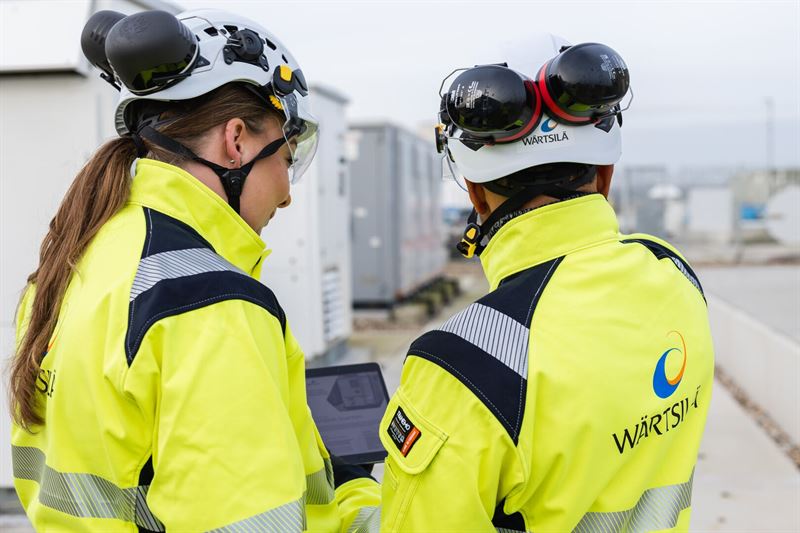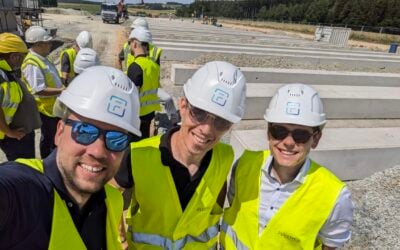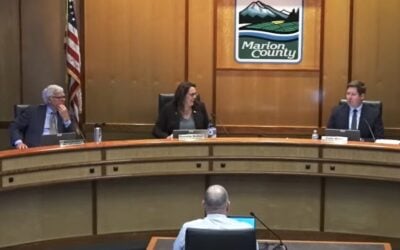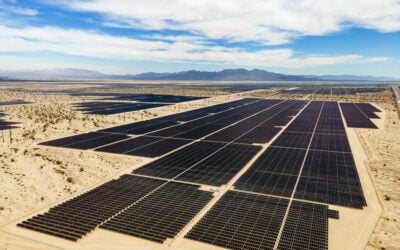
Wärtsilä has carried out more large-scale fire tests on its battery storage units, which the system integrator claimed closely resemble real-life ‘worst-case scenario’ conditions.
The energy storage and optimisation (ES&O) arm of Finnish marine and energy solutions company Wärtsilä Group announced last week (7 November) that a unit each of its Quantum High Energy and Quantum 2 battery energy storage system (BESS) products was set fire to under lab conditions.
Enjoy 12 months of exclusive analysis
- Regular insight and analysis of the industry’s biggest developments
- In-depth interviews with the industry’s leading figures
- Annual digital subscription to the PV Tech Power journal
- Discounts on Solar Media’s portfolio of events, in-person and virtual
The systems were ignited until the fires became self-sustaining and consumed all available fuel. During the tests, the fires did not propagate from the blazing battery storage units to adjacent units.
They follow a set of large-scale fire tests Wärtsilä carried out in the first half of 2023 on a GridSolv Quantum containerised BESS unit (Premium access), which was set on fire and left to burn for eight hours. Quantum High Energy is a higher energy capacity version of Wartsila’s GridSolv Quantum BESS, while Quantum 2 is its newest iteration, both released earlier this year.
The most recent tests were carried out by product certifications and standards development specialist CSA Group.
Their scope went further than the current industry standard UL9540A tests, in which thermal runaway is induced first in a single battery cell and progressively escalated to the whole system level in three further steps.
UL9540A is referenced in the UL9540 standard for safe installation of energy storage systems (ESS), as well as in other standards such as NFPA 855 from the US National Fire Protection Association (NFPA)—widely adopted in the US but also used internationally to set the bar for BESS safety.
“Recent testing of Wärtsilä’s Quantum High Energy and Quantum2 ESS showed that a fully involved, large-scale fire did not propagate into adjacent battery units,” CSA Group fire test specialist Josh Dinaburg said.
“A design that limits propagation allows the local fire service to isolate and control the fire, reducing the overall threat to life, property, and the environment,” added Dinaburg, who is also vice chair of the NFPA Research Foundation Alarm Council.
Evolving standards for fire safety testing
Many in the industry have told Energy-Storage.news that while UL9540A is, in principle, a good testing regime, there are some shortcomings in that it does not go far enough. Also, in some cases, specific workarounds can be found that show a BESS to have a good level of safety in test conditions that would not be found in real life, the site has heard.
The tests conformed to the intent of CSA T-800, a new large-scale fire testing procedure devised by CSA Group to be more comprehensive and applicable to conditions in the field.
CSA Group will be presenting a sponsored webinar with Energy-Storage.news this week on large-scale fire testing, with input from Wärtsilä product safety lead Chris Groves and featuring a look at the new standard.
Groves said last week that the fire tests are also in line with what has been proposed for the forthcoming evolution of NFPA 855.
“These new fire safety measures demonstrate our commitment to going above and beyond existing industry standards, meeting the intent of the new large-scale fire testing requirements referenced in NFPA 855 2026,” he said.
The tests were observed by key stakeholders including owners’ engineers and insurers.
Other BESS manufacturers and system integrators have also carried out large-scale fire testing on whole units, including Fluence, Sungrow and Trina Storage.
‘Noise could be the new fire’
In interview with Energy-Storage.news this year, Wärtsilä ES&O vice president Andy Tang said that concerns over acoustic noise from BESS units is growing.
Particularly as batteries are being deployed more and more commonly in built-up and populated areas, noise could become “the next fire” in terms of community concerns, Tang said in an interview in April, and again at the RE+ industry event in September.
Wartsila said last week that it has introduced attenuation controls—which reduce the intensity of emitted noise—and operational controls that can be customised for the needs of individual projects.
Wärtsilä ES&O programme manager Fadi Zara said the attenuation controls and third-party verified and the controls include things like fan speed adjustment capabilities. The company also offers third-party verification of noise levels through regional consultants.
The topic was covered in a Guest Blog for this site in May by Ethan Brush, energy, environmental and transportation co-market leader at noise and acoustics consultancy Acentech. Brush discussed the different noise sources from BESS projects and how to mitigate their impact.
Sign up for the free ESN webinar: ‘Evolving large-scale fire testing requirements for battery energy storage systems,’ sponsored by CSA Group and taking place Thursday 14 November (11am EST).






